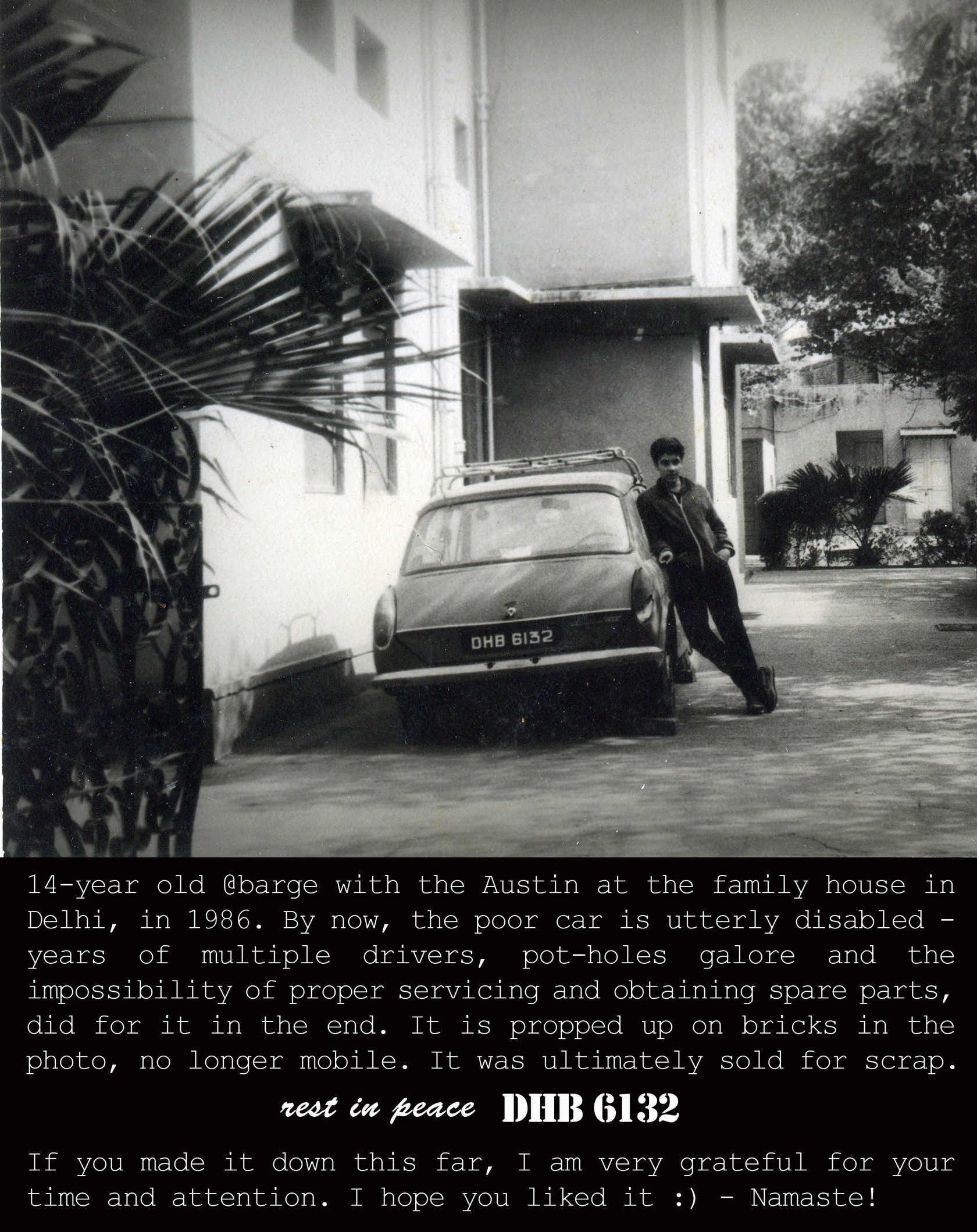
Hey Friends,
Today I'd like to share an account of an overland journey from Scotland to India. This was in 1973, after my parents had decided to move to India from where they were living in Boston, USA. To this end, they bought a 1972 Austin 1100cc in Scotland, loaded it up and set off for Delhi. They had a 7 month old baby with them – yes, you guessed it, none other than @barge, his little self :). My only sibling, my wise little sister, arrived on the scene around a year and a half after we had moved into the family house in Delhi.
The drive from the UK to Iraq – where we were to embark on a ship for Bombay – had initially planned to be 4 weeks, however, due to visa complication delays (my mother a British, and father an Indian passport holder), it had to be cut down to just two weeks.
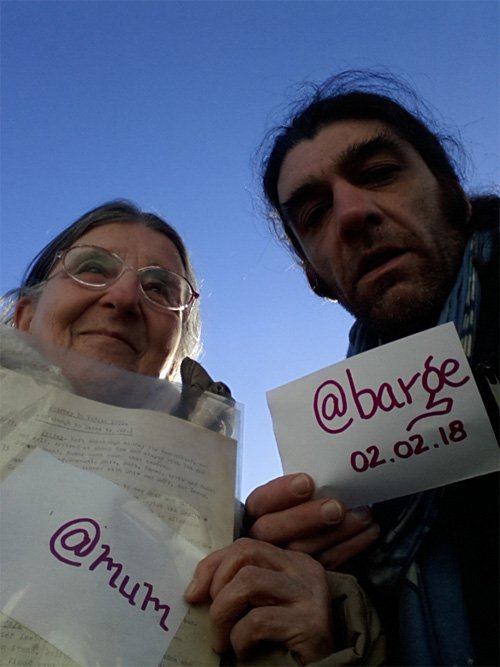
My mother kept a brief daily journal which she typed up at some later point in time, so the bulk of this post will be in her words, retyped and mildly edited by me, 45 years later. What I would like to share is the section of the journey between Badhofgastein (Austria) and Basrah (Iraq), where we boarded the Bombay-bound ship – the 'Dwarka' – just in time; this is also the point at which the journal ends. The section I am presenting covers the journey from Austria, through the former Yugoslavia, Bulgaria, Turkey, Syria and into Iraq. The photographs of the trip are digital scans from slide-negatives. I am not entirely certain where some of them were taken, so I have placed them where I think they fit, and without captions. Any other images or graphic materials are source-referenced. I also use the following abbreviations:
- 'L' – my mother and narrator of the journal
- 'V' – my father
- there is no 'B', I'll just be my (little) self - 'Barge'!
In general, I am very grateful to my parents for having made this journey from West to East, a journey that crosses many frontiers - physical, mental, emotional and even spiritual planes. I thank them deeply for having decided to move to India from the US. This was a brave decision which had momentous consequences for all of our lives (waaay outside the scope of this post :), not least the making of who I am as person with fluent linguistic, cultural, social and practical, access to two seemingly different worlds, gifting me the possibility of a synthesis. Discovering and embodying this synthesis has been a major part of my dynamic, ever-evolving bargeconsciousness and I am beginning to really appreciate and love it for what it is!
Please be aware that this is a rather long post. I hope you may find it interesting.
Thanks for reading
Namaste
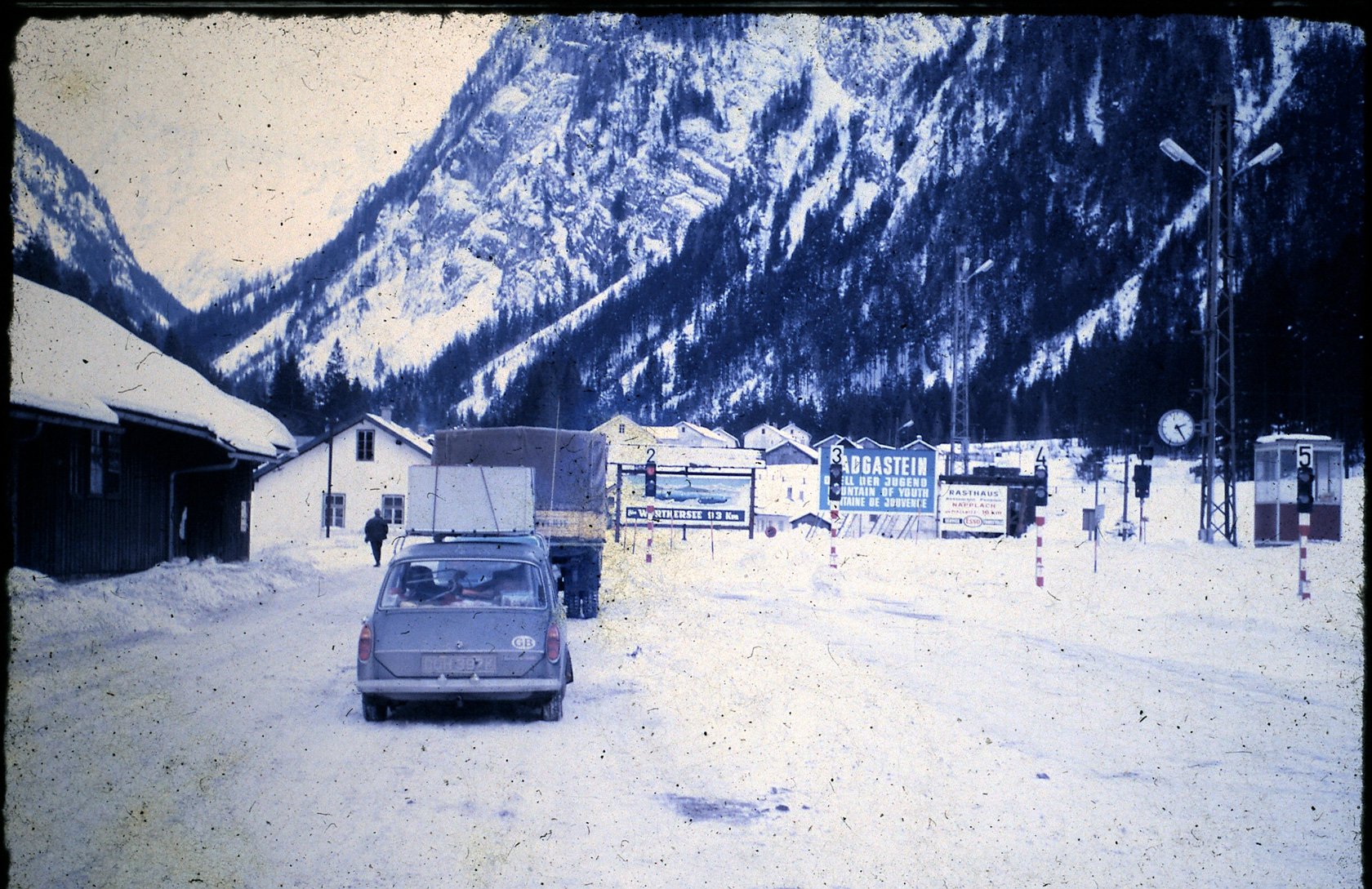
Wednesday, 28 Feb 1973:
Badhofgastein (Austria) to Mjostrana (Yugoslavia)
Beautiful sunny morning, high jagged mountans, white against a deep blue sky – exactly like the Tyrolean posters! Nearly everyone has a ski-tan, and we saw a GB plate. Set off again in the afternoon for the Tavern Tunnel and Yugoslavia. Spectacular drive of course, climing up to the 8 mile tunnel – drive on, drive off a ferry train – even more spectacular descent towards the border. We are avoiding the Italian pass as V hasn't got a visa, but the one we are taking is narrow and over another range. Again, by great luck, the road is clear but too steep to risk stopping to take in the wonderful view as we climb up gradients 1 in 4. Initially, the approach seemed to be one of sheer mountain face, but somehow the road was made and we reached the border at the top. The Yugoslav patrol was very helpful in pointing out Mjostrana, which luckily is a few miles within the border and only just off the main road. Here, the houses look Tyrolean, naturally enough, but poorer versions of the picture postcard type. Many people walking on the main road. As we approached the village of Mjostrana, we asked for and were personally escorted to the address of Matar and Mush Podrekar, meeting Mush just outside the school where she teaches and near where they live. Climate healthy but cold, and living conditions reminded L of the Highlands, where most goods are available, but luxury goods at a minimum, and mod. cons limited to the bare essentials. We had brought over some tea from a mutual friend, for coffee of the Turkish variety is mainly drunk, and tea of the English type not at all. Matar had been playing a victorious football match and returned late. An engineer, no English, but managed to 'converse' admirably. Drank some plum brandy – brewed locally and strong enough to satisfy the hardest of tastes.
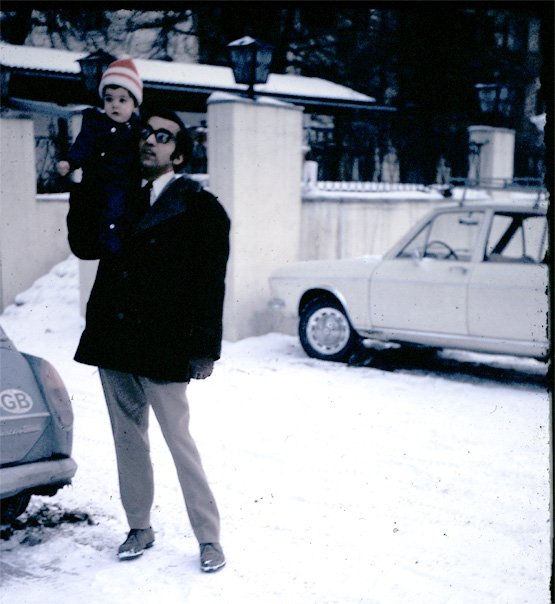
Thursday, 1 March 1973
Mjostrana (Yugoslavia) to Belgrade (Yugoslavia)
Set off in brisk morning sunshine – solid ice till the main road where it had been salted. Road gradually improved somewhat, obviously not a state priority though it gets quite heavy traffic, being a through route from north to south Europe. As we drive down the valley of the Sava, we leave the clear mountain air for smoky, and the snow retreats to the bordering hills. We stopped at an inn for breakfast – scrumptious cream and jam cake – a hit from the menu in Serb which, although written in Roman script, is still rather a mystery. The faces are beginning to take on the more rugged look of the Mediterranean peoples, though there are plenty of blond(e)s about. The countryside becomes flatter and flatter, and we see avenues of eucalyptus and poplar. The towns and villages we pass through look fairly prosperous and well-stocked but the people have a predominately country appearance. We press on hard for Belgrade, a long journey, but arrive eventually at the outskirts around 5pm. The hotel we stayed in is comfortable but only with the bare necessities. One is well aware of being in a Communist country, but there is not the oppressive atmosphere that is supposed to go with it. We had a superb meal with wine, not at all expensive.
Friday, 2 March 1973
Belgrade (Yugoslavia) to Bulgarian border
Before leaving Belgrade we went up to have a look at the old fort which has a commanding view of the merging of the Sava and the Danube. Then a stop at a roadside cafe for lunch – also lunching were 4 travellers en route for India in a Mercedes. We decided to make for a border town as we don't know how long the Bulgarian Authorities will take to let us through. As we progress, the script is mostly Serbo-Croat and a number of villages have minarets. These villages look less and less prosperous with a higher percentage of tumble-down houses and swine-herd cottages of the eastern Europe fairy stories. We stop at a motel in a village near the border which is quite high up in a range of hills. Lots of snow and ice, but roads quite passable.
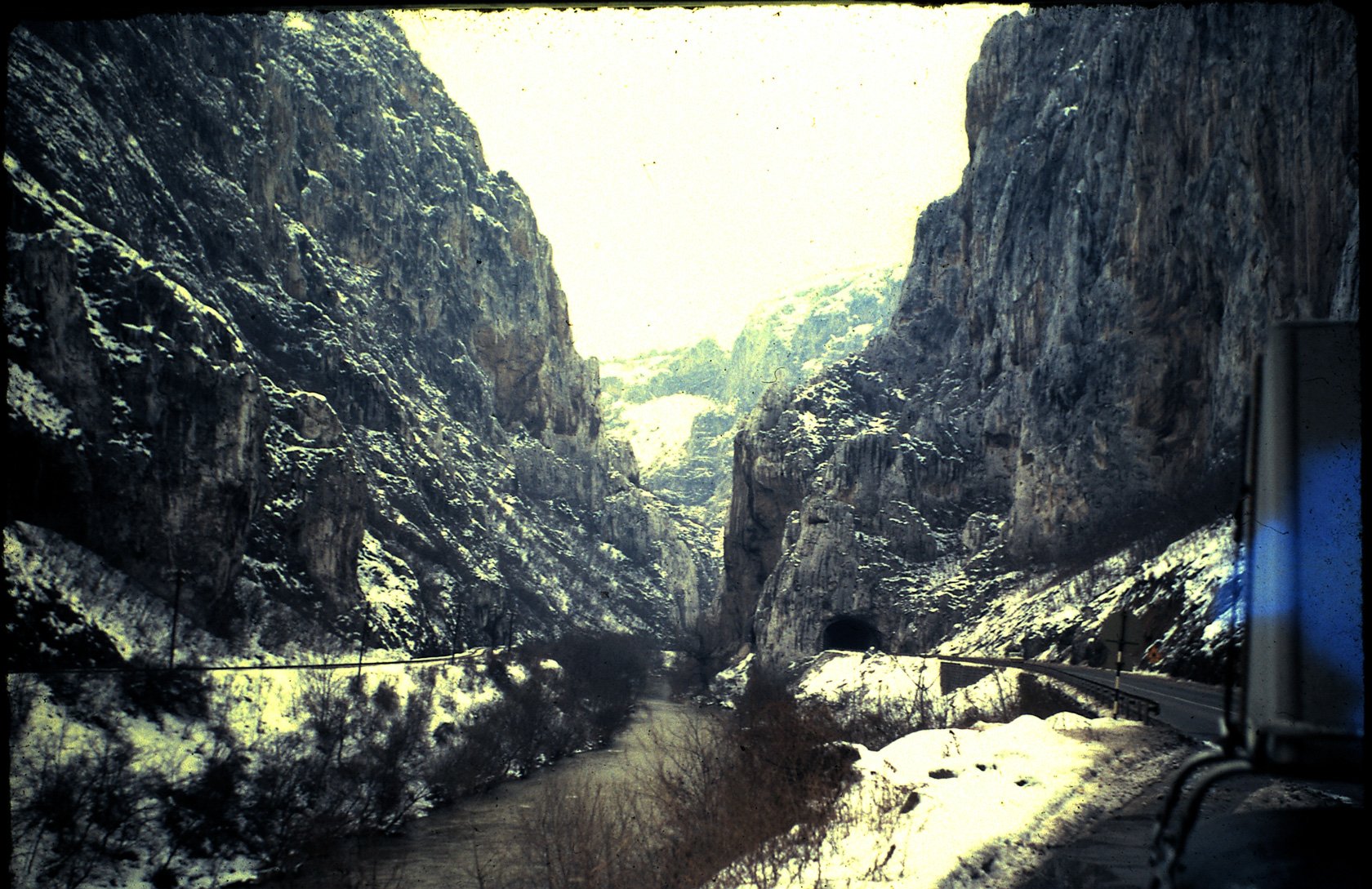
Saturday, 3 March 1973
Bulgarian border to Edirne (Turkey)
Have some trouble with dollar exchange – would have done better to convert to marks or dinars. At the Bulgarian border we have to pay a hefty toll of $20 for the privilege of passing through, and although we were made to wait a while before being cleared, didn't suffer the fate of some Turks who had every item searched. Road not too bad, mainly because the heavy lorries have broken down the pack ice. Initially the going is slow till we are past Sofia. We pass through a mountain gorge and in front of us a bus stops and a man gets out. Almost immediately he disappears into the sheer rock face. Then we discover a narrow opening, a path leading to some distant village. We skirted Sofia via a cobbled ring road – very uncomfortable and the scenery not very distracting for there is quite a bit of smoky industry. Fortunately the roads are numbered though we can sometimes make out the town names from the script. We stop at the Bulgarian equivalent of a hamburger joint – very tasty kebabs. We wash our hands in a very cold mountain stream which serves a fountain just by the cafe. As we cross Bulgaria the day gets warmer and the countryside flatter, villages of brick with the occasional minaret. There still remains quite a bit of Turkish influence, as in South Yugoslavia. We arrived at the Turkish border late afternoon, not too long a wait, though some of the items inside the car were inspected. We collected some maps from the tourist office at the border – a useful feature of all the countries we have passed through . We stop in Edirne, at an 'oteli', comfortable and with reasonable food, though the power failed for an hour. Up to now we have not excited too much curiosity; here we are besieged the minute we stop anywhere.
Sunday, 4 March 1973
Edirne (Turkey) to Istanbul (Turkey)
The road to Istanbul is good, but not very interesting. There are lots of little villages, each with at least one minaret. The women may have shed the bourka, but nearly all those in the country wear a scarf or veil, round their necks and heads and often covering their faces. The dress is not at all becoming – large baggy trousers with blouses scarcely reaching the waist. True to the guidebooks, there are lots of tea-houses, nearly all full without a single woman sitting. In Istanbul the appearance, as expected, is western, in particular, American. Driving in the city is pretty chaotic – it is now quite warm, though there is still a wintry haze about. We drove along by the city wall, across the Golden Horn, and skirted the Bosphorus to a hotel right on the edge of the water. This is certainly a beautiful stretch and much is made over for the tourist trade. The hotel is luxurious but the food does not match, though the orange juice is freshly squeezed and the sweets are very tasty.
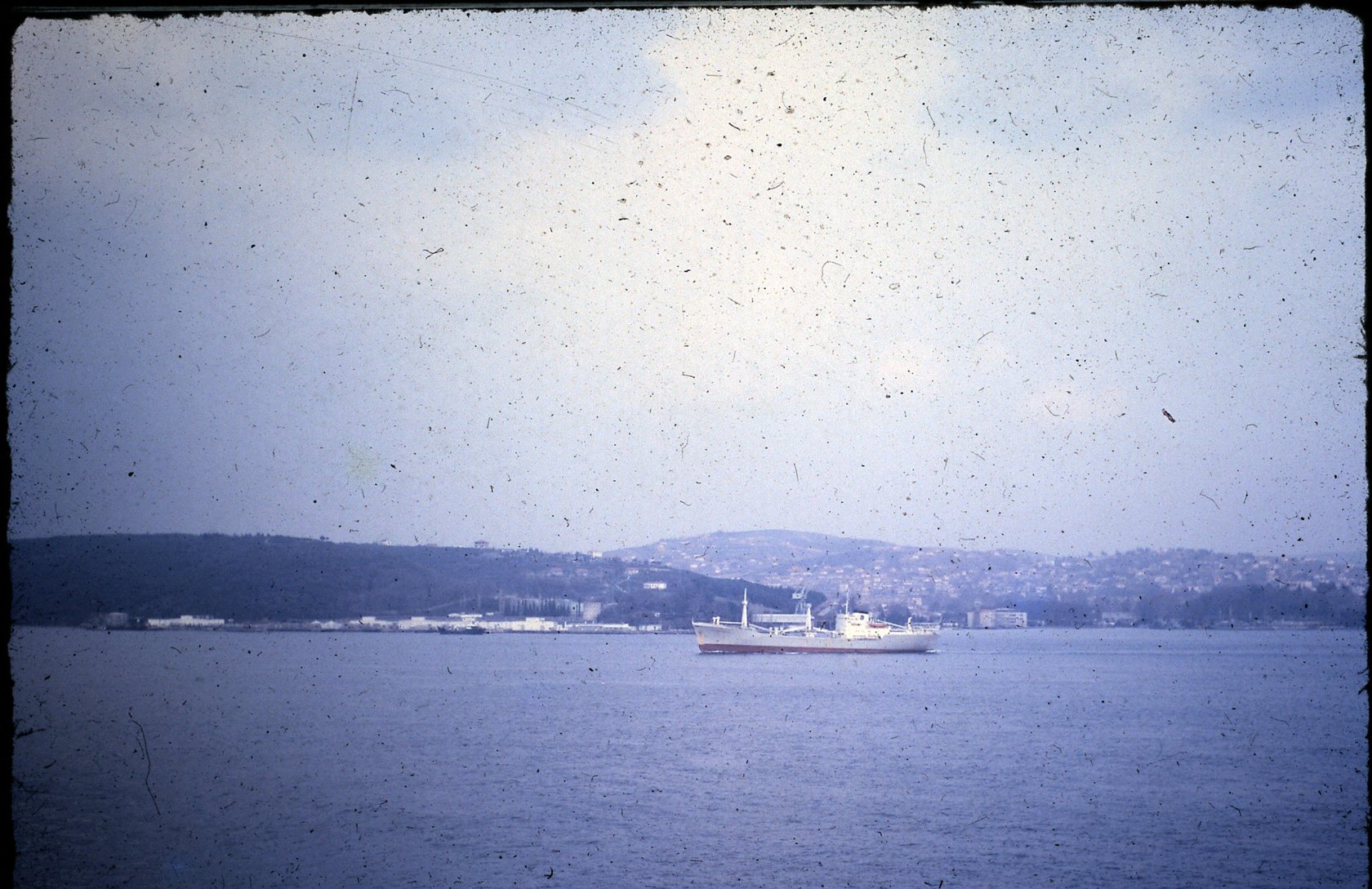
Monday, 5 March 1973
Istanbul (Turkey) to Bolu (Turkey)
A horrible imitation of an English breakfast is the only thing served, but the day promises to be good and we leave the car for servicing. We hired a taxi for a brief tour of part of the city to the Blue Mosque, St Sophia, the covered bazaar and the heart of the Ottoman empire. The Blue Mosque, not as blue as expected, perhaps because the day is still rather dull, is floored with a fortune in carpets. St. Sophia is closed, very disappointingly, for there is supposed to be a marvellous chandelier, typical of the Byzantine era. The covered bazaar is simply a tourist trap and primarily for the Americans at that! A brief visit to the Ottoman Palace (Topkapi) hardly worthwhile for it has been allowed to decay rapidly and whatever one does see does little to impress, considering the size, wealth and duration of the empire. Mediaeval in structure and furnishings, the buildings look as if they had been abandoned in the 18th century, rather than the 20th. Whatever has been spent on historical upkeep is obviously reserved for the army and the tourist trade. Army camps and patrols everywhere, good roads and US-type accommodation – also US lack of public convenience! We set off for Ankara in the afternoon, stopping en route for a snack. It got quite misty so we couldn't see much across the Marmara sea, or of the mountains in Anatolia. Here it is still fairly mild and we shall probably stop before long – rather ambitous to climb up to Ankara at night, with so many lorries on the road, belching horribly and making crazy overtakes. The descent to the plateau was indeed slow and a thick fog forced us to stop at a brand new motel, some 20 miles before Bolu. This was right at the top of a mountain, very cold and icy, but very welcome after a hazardous climb – guided by a lorry driver who obviously knew the road, and to whom we stuck like a magnet.
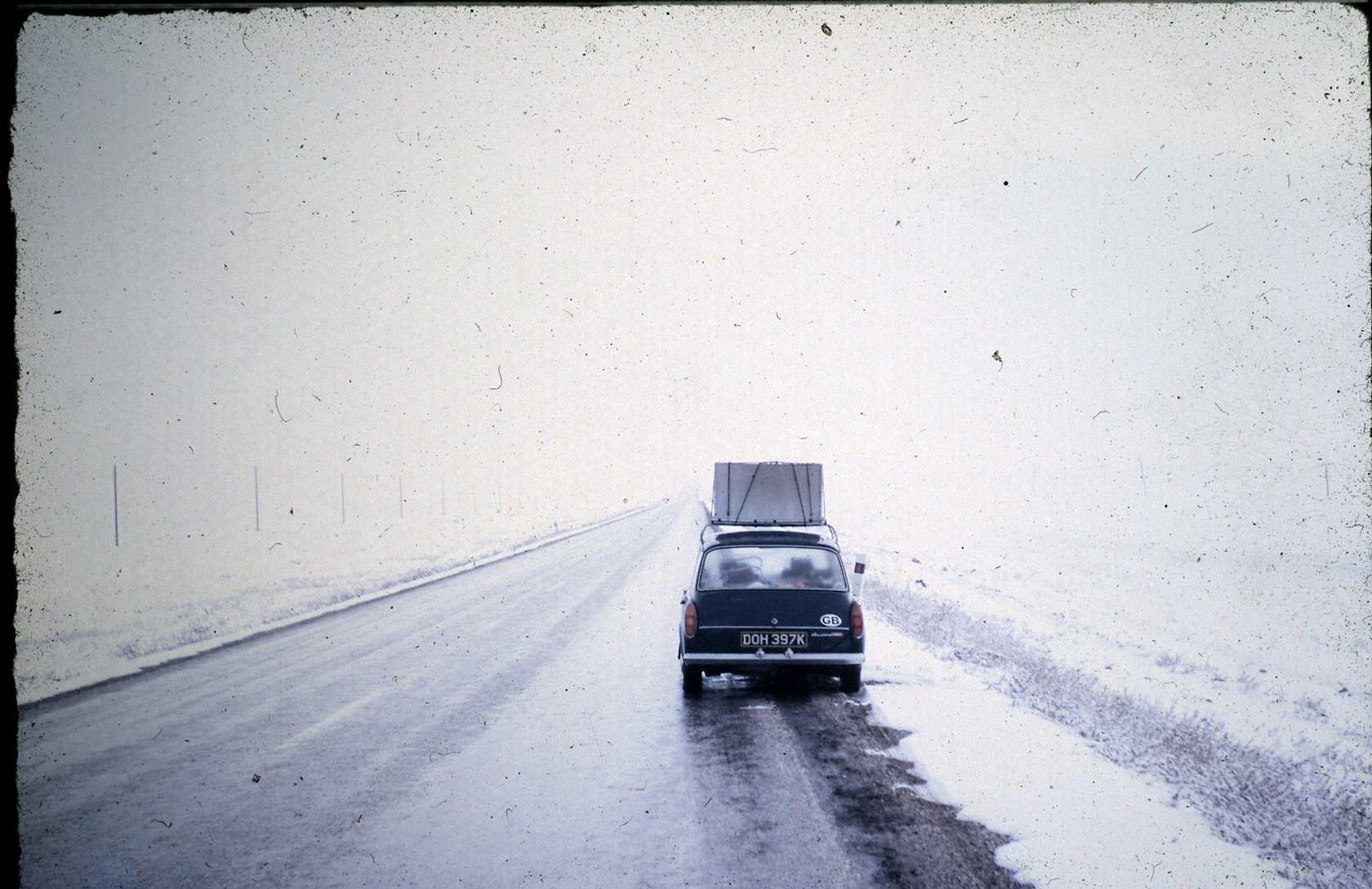
Tuesday, 6 March 1973
Bolu (Turkey) to Konya (Turkey)
A very different world from yesterday – bleak mountainside surrounding this clump of fir trees and motel. The breakfast was very good – some local preserve and goat's cheese and scones. All around as we drive are mountains, and, alongside the road, villages at intervals, all with minarets, tea-houses and an air of hard living. Ankara we reached at midday and wasted some valuable time trying to cash dollar cheques. Obviously a new city, dual carriageways and lots of concrete. As we left, it started snowing heavily, but the road is good and we make good progress. Originally we intended to make for Adana, but with this delay, we head for Konya, right across the plateau. Almost as we leave Ankara, the horizon stretches and in all directions for the length of the drive, we see nothing but an expanse of snow. The journey would be monotonous if the scene were not so unusual. The snow is hardly a couple of inches on the ground, but the bleakness would be frightening, if it were not for the odd petrol station and villages along the way. There is hardly any traffic, fortunately, for a wind buffets us about. We see a lone figure waiting for a lift to somewhere – difficult to imagine such a mundane occurrence, let alone what existence the villagers must lead. The buildings that we could see looked like square mud hovels, and apparently opium is the only crop with the possible exception of a few blades of wheat. Where the wind had cleared the ground of snow, we could see a barren surface completely tree-less. We passed the odd lake and, like the land, devoid of any bird or animal. As we neared Konya, the road surface cleared to a slush and, on arrival, we found many fairly modern buildings. The oteli we stay in, though like a YMCA, is run by an interesting chap. V's German comes in extremely useful and the proprietor took us to a nearby restaurant where we ate a thoroughly enjoyable meal.
Wednesday, 7 March 1973
Konya (Turkey) to Adana (Turkey)
We would have liked to stay here to look around, for there are some very interesting remains of various cultures including Hittite, but we have to be off to make sure of reaching Adana and get through the Taurus Mountains. This speed of travel is most frustrating for there are any amount of interesting sites (and sights ) en route. We set off into the snowy desert, the wind whipping up the snow around us. After a while the surroundings clear of snow and we see the odd poplar grove around a village. As we approach the edge of the plateau, we see one or two hills of solid granite, smooth with scarcely any rubble, let alone vegetation. Beyond us are the mountains, snowy and forbidding. Once in them, the road becomes rough and twisting. We have to go very slowly because of the heavy trucks which observed few cautions, and, at one point, one had landed in the ditch.
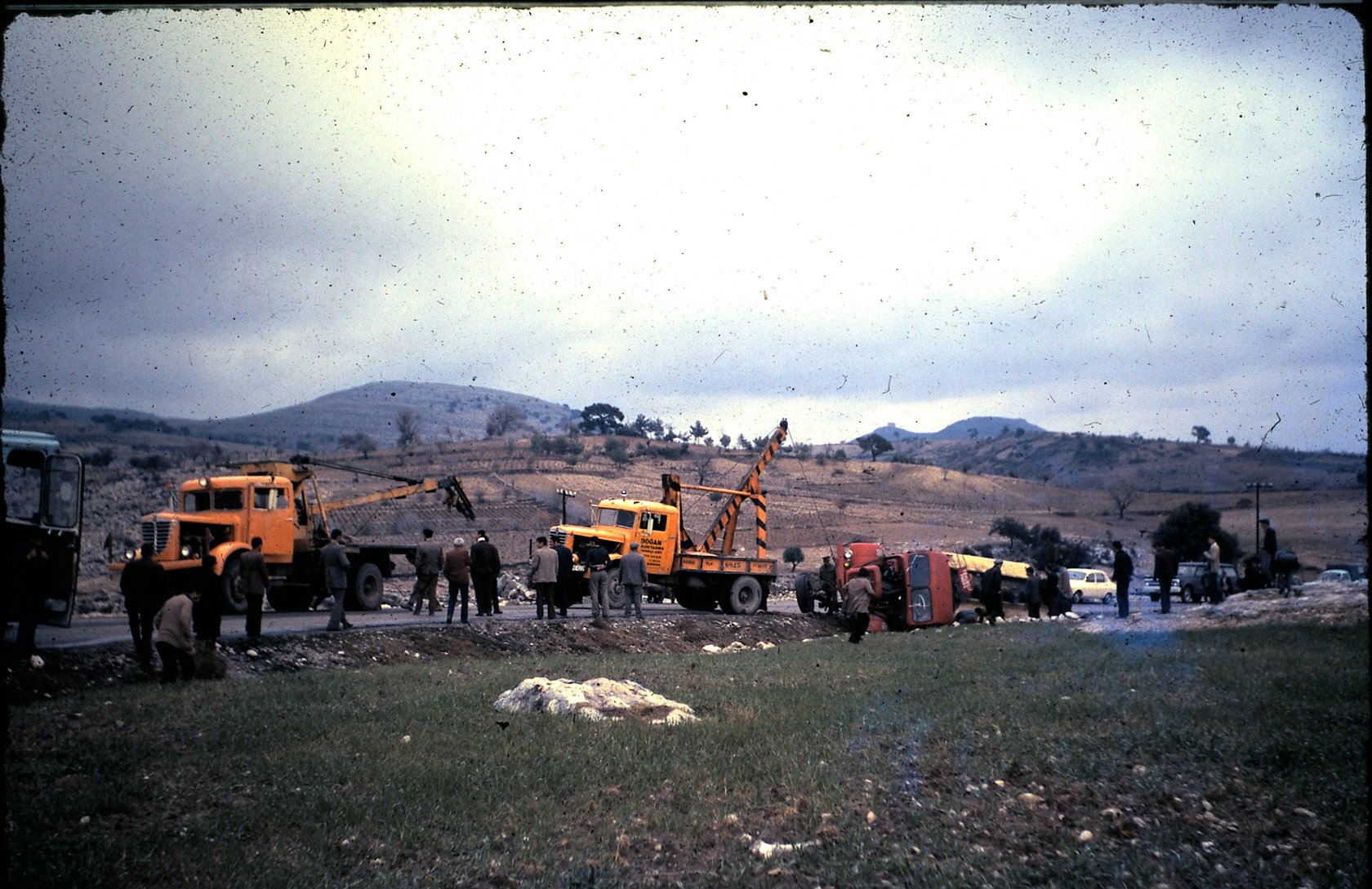
We had to wait, while the breakdown truck tried to right it but without success. At the critical stage, when there might be some hope of achieving this, the overturned lorry was dropped, thus ensuring its wreckage. However it meant the road was now clear, for nothing more could be done and we streamed past downwards. After the steppe villages, the mountain villages have a much more prosperous look – brick and stone houses, with tea-houses and otellis. As we descend, the snow disappears and we see the odd flock of goats and a few more trees. We take a slight detour to visit Tarsus, not much remains, and what does has been defaced. But there are eucalyptus trees by a stream, shepherds with flocks of goats and sheep, and one senses the antiquity of the surroundings. At the otelli in Adana we met a couple who had studied and worked in Manchester. The wife is a social worker and husband a chartered accountant, she with rather sceptical views about her country in contrast to her husband's enthusiasm. They selected a dinner for us – quite spicy with naan type bread. We still have heating so the nappies can be dried easily, but there is the usual mountain of luggage to be carted in and out. V is getting on quite fluently now with his German. One interesting thing, people don't know where India is exactly, but they all know of Pakistan. Perhaps just as well, for relations between Turkey and India are not good, so V says his country is 'near' Pakistan and refrains from saying 'Hindustan', which would probably pinpoint his nationality.
Thursday, 8 March 1973
Adana (Turkey) to Mardin (Turkey)
We set off in sunshine and the day promises to be quite warm. As we go, we travel along a flat plain with the Taurus mountains in the distance, snow-capped against a blue sky. There are abrupt hills here and there, like eruptions, one or two with ruined forts on them.
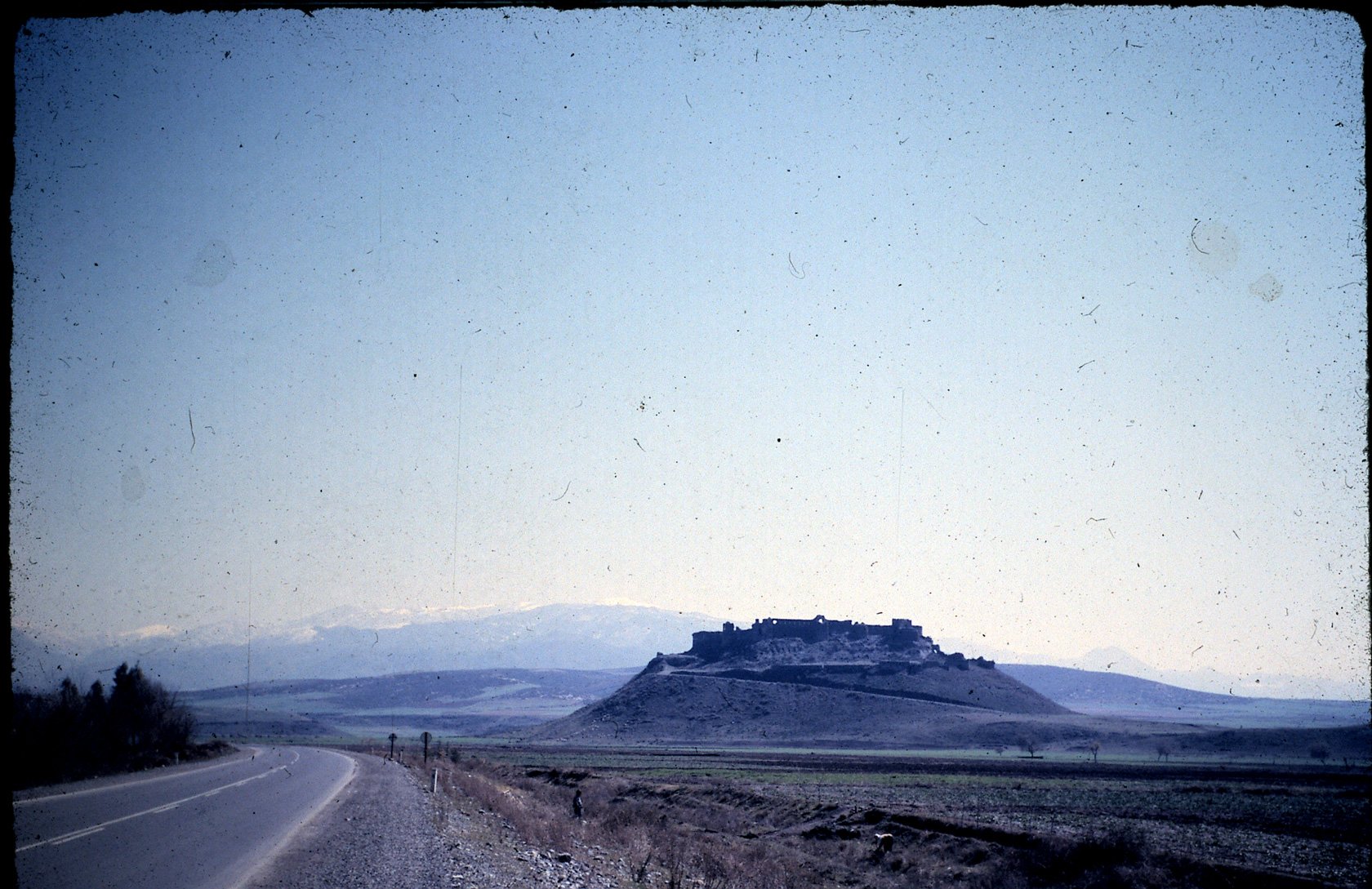
We head towards another snowy range and, as we climb, we meet the army on manoeuvres. The view is fantastic as we descend. Rich flat lands stretching to Syria with two straight ribbons of road, one south and one east. To the north are more mountains, snowbound as well. We pass many villages, and shepherds with flocks of sheep and goats. We pass by orchards and women working in the nearby fields. The villages don't look up to much – not much more than mud hovels – clustered together sometimes within a compound wall. We stop for lunch at Gojiantep and eat a Turkish version of pizza. Immediately we are the object of curiosity, and Barge in particular, draws comment. Near us – we are actually on the outskirts of the town, which is small in any case – is a large grove of cedars, yews and eucalyptus on grass, enclosed by a wall – a cemetary, but in such cool green surroundings that provide a startling contrast to the predominantly rocky and dusty environment. The road is still fairly good, but at one point completely broken for about a yard. Fortunately it is still light but we are anxious to reach Mardin before dark. This was not possible, but we were compensated by seeing the town at night from a distance. There wasn't much traffic on the roads, the odd lorry covered with colourful protection symbols, and we could make out a village only by a small twinkle of light and a dog barking. As we took the turnoff for Mardin, we could see what looked like a cluster of stars at a fantastically low level and quite near. We then realised that this was the town of Mardin, perched on top of a hill. We had to circle the hill twice before reaching the first houses, and then decided to make do in one of the two otellis. Compared to our previous accommodation, this was poor indeed. To get to the sleeping section, we had to climb some dark and unsavoury steps, and then through a tea-room. No heating, but at least the sheets were clean. No hot water either, but at least a basin with cold running. But the service was good, and the cheapness somewhat compensated for the extravagance of Istanbul. There was a miserable stovepipe in the corridor outside our room, and we did what we could to keep warm.
Friday, 9 March 1973
Mardin (Turkey) to Mosul (Iraq)
Again a lovely morning, and a view to match. Mardin is actually a very old city fort for it sits on a solitary hill commanding a vast rich plain to the south and fairly flat land to the distant mountains in the north. Needless to say, the army have taken over the summit and we had to be careful not to appear too curious. The town circles the summit with buildings on either side of the one main street. They are obviously pretty old as Mardin has been a strategic point since before the 13th century. We tried bargaining for a tea set, but as the owner insisted on a ridiculously high price we didn't buy it. At the foot of the hill is another large army camp, and once back on the main road to Syria, we came across a few more army posts. This road of about 300 km to the border is being improved but is currently so bad, that the dirt track beside it is being used more frequently. The people here look mostly Arab, and probably are, and a few wear Arab headdresses.
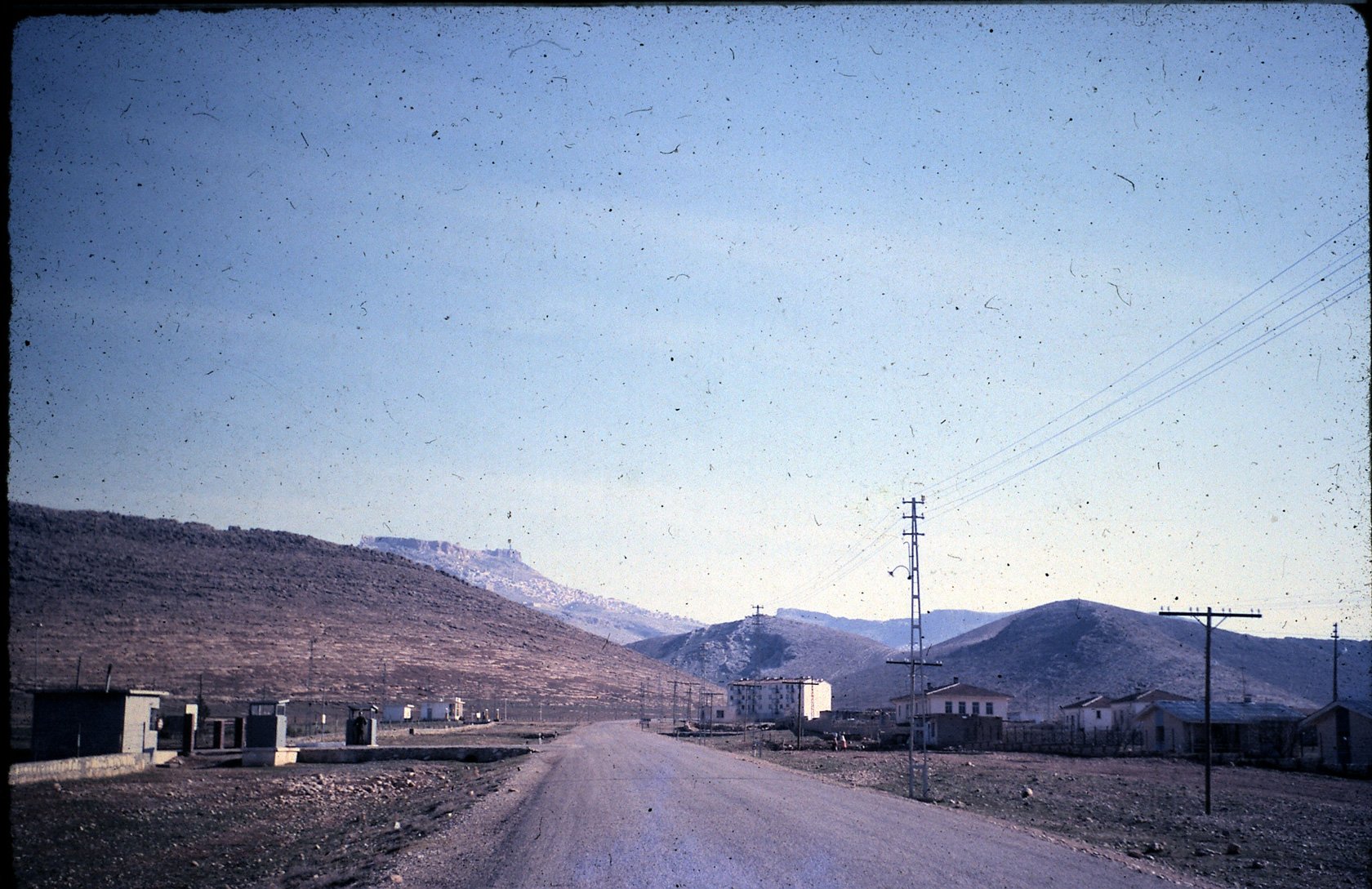
The Turkish border town looked a right dead end and we had to wait at the customs post for the officer on duty to come and deal with us. Not a long wait and quite pleasant in the sunshine. On the Syrian side we met petty officialdom lording it over his little domain. A few Turks were having a tough time and we were made to wait a considerable length of time while our papers and baggage were checked. We had no Syrian currency and had to pay handsomely for the privilege of crossing the country. This border crossing is used almost exclusively by locals so we were put under strict scrutiny. We had come this way rather than by the northern crossing avoiding Syria, because we were under the impression that the Kurds were still fighting the Iraqi govt. Later, in Iraq we discovered that an agreement had been reached just recently, and all is now quiet. The road through is not much better than the one we had just left, being full of pot-holes and, like the local lorries, we use the dirt track. The villages are similar to the ones we saw in Turkey and the women have similar voluminous coloured skirts, blouses and headdresses. We stopped for lunch and took out the camping stove.
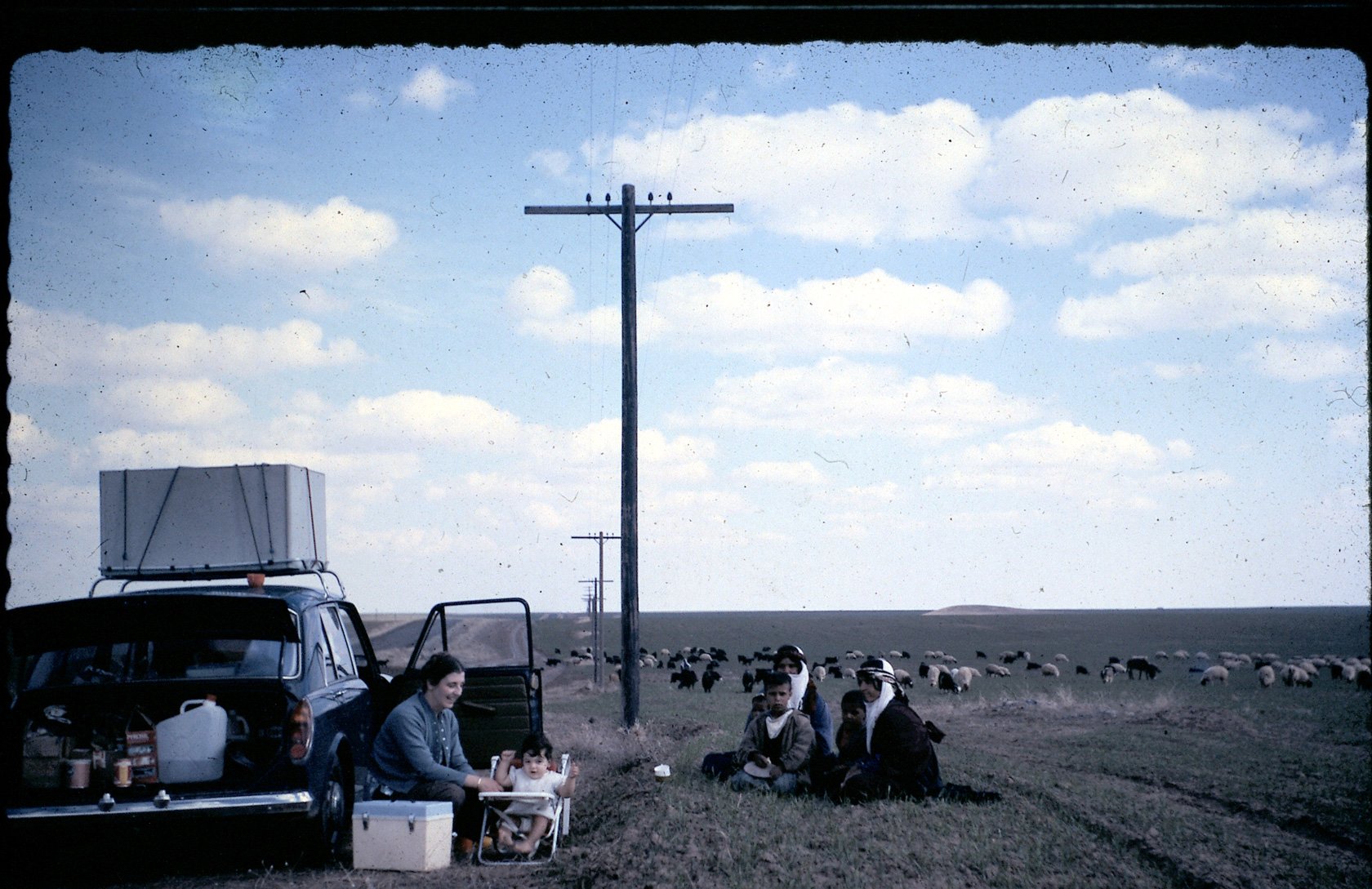
A couple of women with three children stopped by to have a look at us. We gave them some tea and V managed to make some conversation by digging up a few words similar to both Arabic and Hindi. The women were heavily tattooed and, although not very young, they probably looked older than they actually were. A shepherd passing requested a drink and when V gave him some of the water we had tanked in Konya, he was most astonished, for here the water has a muddy flavour and he was not expecting this clear sweetness. We reached the Iraq border by mid afternoon and the nuisance of formalities with the Syrian custom official paled to insignificance beside the Iraqi inspection. Three posts to get through, first immigration with not too long a wait. Then customs. We arrived third in line and after about an hour our luggage was minutely examined. Nearly every item down to a box of kirby grips had to be explained, and V's briefcase suffered a similar fate. Finally, the third post, where a list was searched to see if we were prohibited persons. Apparently there is a govt. ruling that nothing Israeli, or anyone or item associated with Israeli sympathies may be allowed entrance. The offending item is confiscated no matter whether the importer be aware of the offence or not. As we had a couple of letters from an Israeli friend, we were extremely lucky to have these go undetected, for there are difficulties enough ahead at Basrah, without official displeasure. The road to Mosul was part good, part very bad. Luckily the bad part was before the time darkness fell. Obviously no US, German or Italian influence in this sphere, for the way the road-making is tackled seems illogical to a point of extreme annoyance, as if one order was partially carried out, only to be countermanded by a different one. In short, we used the dirt track until the completed part was reached. As most of the signs, naturally, are in Arabic, we decide to ask the way to a certain hotel which had been recommended. A very helpful man informed us that we were mistaken in the name of the hotel, but took us, out of his way, to a very nice one overlooking the Tigris. But the food was mediocre – we wanted Iraqi and were served English! In the lobby and on the stair walls are anti-Israeli propaganda pictures.
Saturday, 10 March 1973
Mosul (Iraq)
V goes into town to try and get some dollars changed and collect some Trucial visas. We have been losing hand over fist with the dollar dropping and are now having to work out whether we have enough to get us to Bombay. We are having to cut out the trip to Abu Dhabi to see Rob and Anne, and in any case, there are complications about getting a visa for Kuwait from which we would fly, picking up the boat at Dubai. However, we had the good fortune to meet a great friend of Kais Tappuni. V had casually mentioned that he wanted to contact Kais to one of the bank managers, and this man, Mr Ibrahim, not only gave us information about Kais, but offered to show us round Mosul. So, in the afternoon we saw one of the gates of the Assyrian city of Nineveh, which is being restored. There is enough here to keep archaeologists busy for years, and although progress is slow, great care is being taken; missing stones of the wall are being replaced so that eventually the four gates and walls will be reconstructed. Fortunately there are no buildings over the mounds.
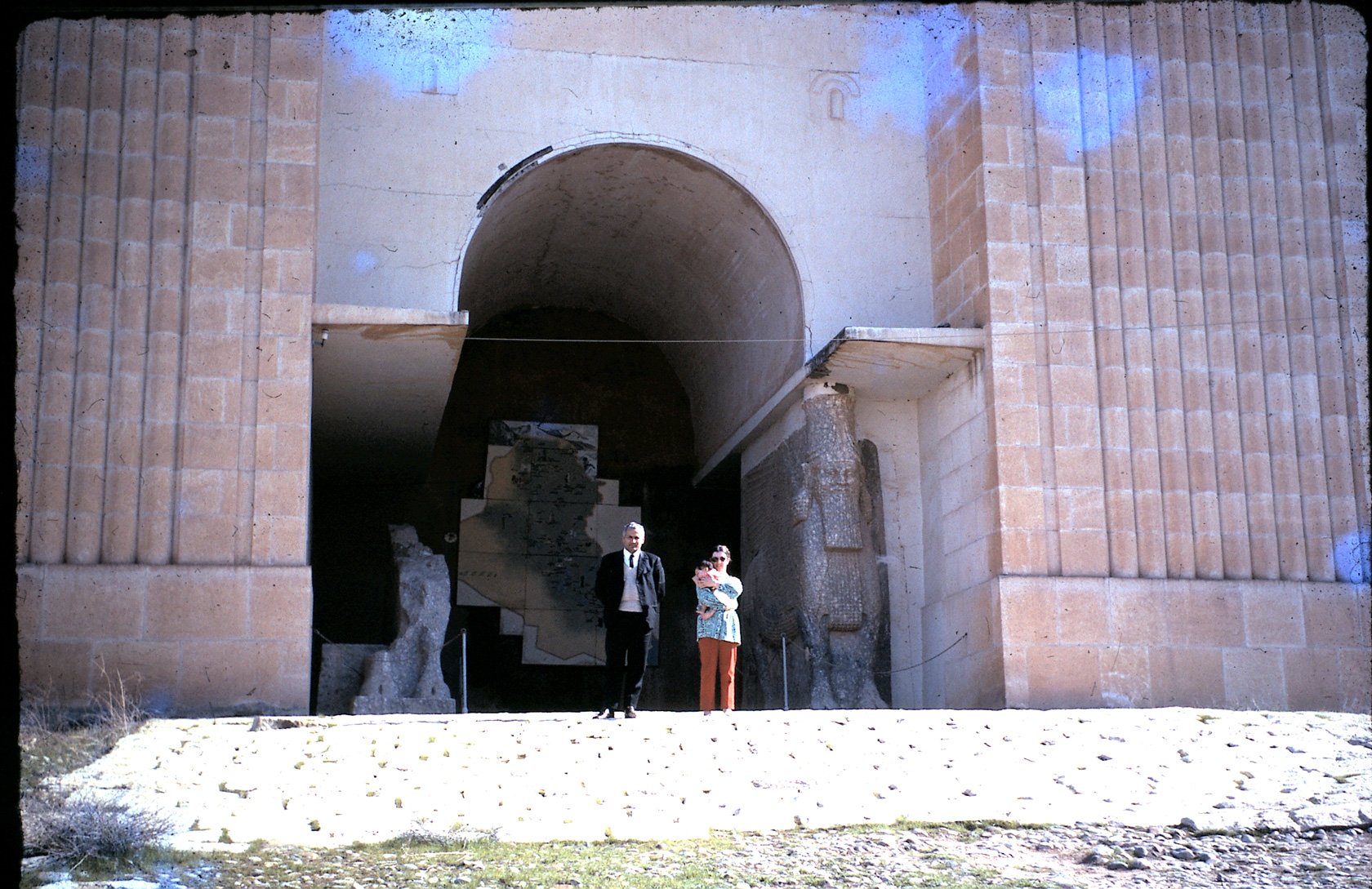
It is a glorious day, quite warm, and we had a pleasant meal overlooking the site. Then we had a look at an old Turkoman fort situated on the banks of the Tigris. Not much remains. Finally, we saw a 9th century Orthodox church in beautiful condition. The transept had been pulled down but the courtyard remains. In the evening we went with Mr Ibrahim to visit a friend of his, a South Indian, an agricultural adviser to the university in Mosul, and his wife. He gave us some useful advice about farming possibilities in India, and some contacts.
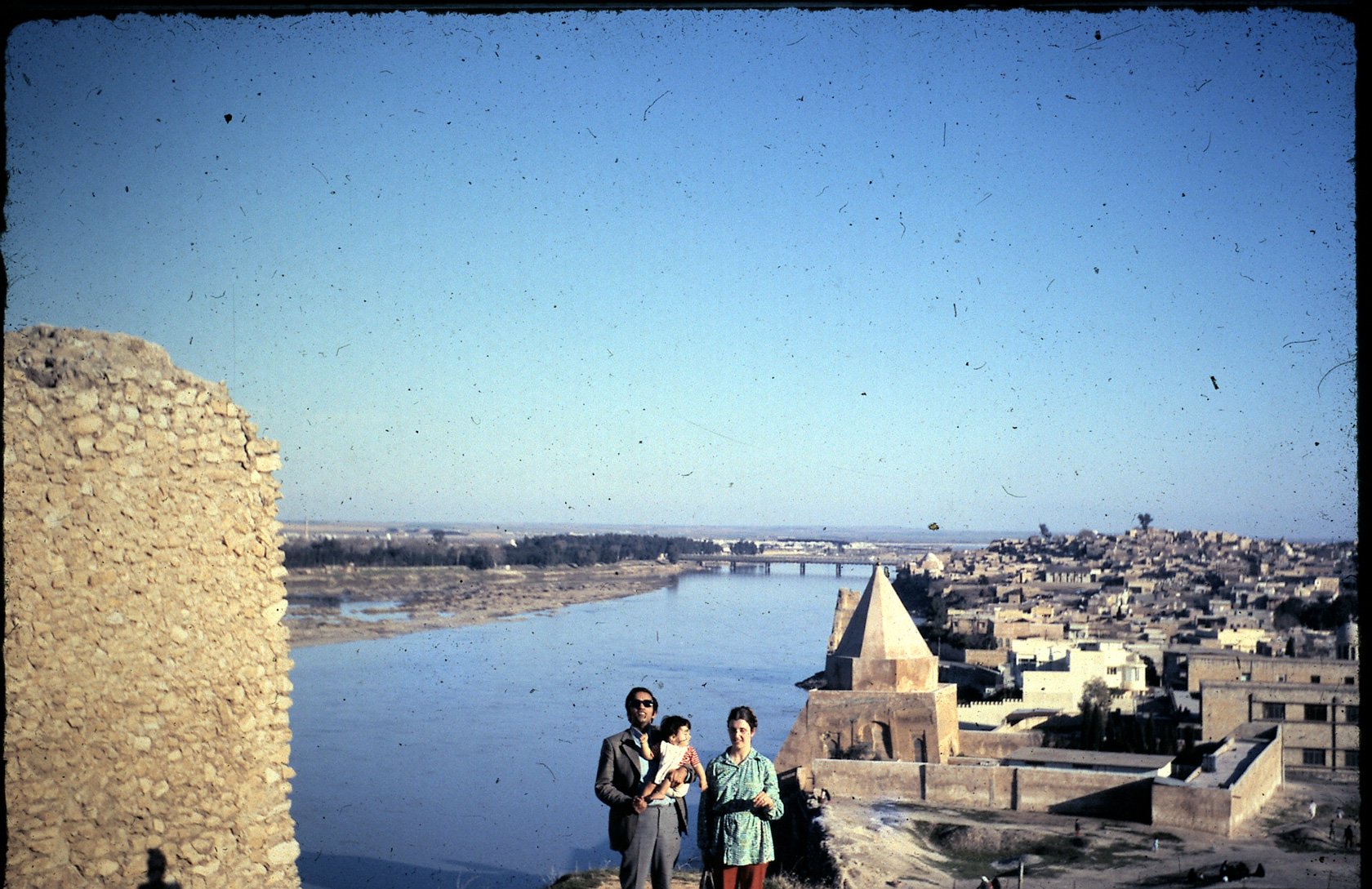
Sunday, 11 March 1973
Mosul (Iraq) to Baghdad (Iraq)
Set off for Baghdad – road good – and now decidedly warm. As we travel down the Tigris valley we notice how sparsely populated the country is, and the astonishing poverty of the people in the villages considering the richness of the land. Moreover, most of the ground is uncultivated and, in between stretches of river water, barren. On the way, we passed a curious tower – like a screw, beside a four-walled enclosure. Apparently some 17th century bigwig wanted to ride his horse up to the heavens! Also looking at this tower was a family of Central Asians, women uncovered, and interested in Barge. There is a wealth of carpets in Iraq from such travellers who come over on pilgrimages and find a market for selling them to pay their way. We reach Baghdad by about 5pm. The town is quite picturesque and we cross the river which has been dammed. We ask a stranger if he knows where Kais' father's surgery is. He does, incredibly! Apparently Mr Tappuni senior is a very well-known person. Mr Tappuni suggests a nearby hotel and at dinner, Kais comes round. It was wonderful to see him again – same tremendous sense of humour and ready wit. Obviously doing well, but working hard and enjoying it – a great change from our student days. He, like so many other electrical engineering graduates, has gone into the computer business and has done well in a field that is new in most countries apart from 'the big four'. He explained the govt.'s fanaticism over Israel and said how many young men were fired to go over to participate in liberating Palestine.
Monday, 12 March 1973
Baghdad (Iraq)
We spend a leisurely day in Baghdad, Kais driving us round the city which is rather like Delhi; expanding colonies of a growing wealthy class, and wide tree-lined streets. Here, as all over Iraq, the women to be seen are few and then nearly always covered with the abaya. This makes for the perpetuating situation, seemingly whereby any woman abroad is an object of curiosity, and one without the black covering immediately calls for attention, thereby increasing the need for this sort of protection. But perhaps this will only last another generation, for it seems that girls wear their abayas only to please their fathers, and often we saw a mini-skirt under an open-fronted abaya. It seems that most of the men do most of the household shopping and so this may contribute to the scarcity of women on the street. Certainly after dark, any woman, covered or not, is a rarity. We had a very nice dinner with Kais and his English wife whom we knew slightly from Manchester.
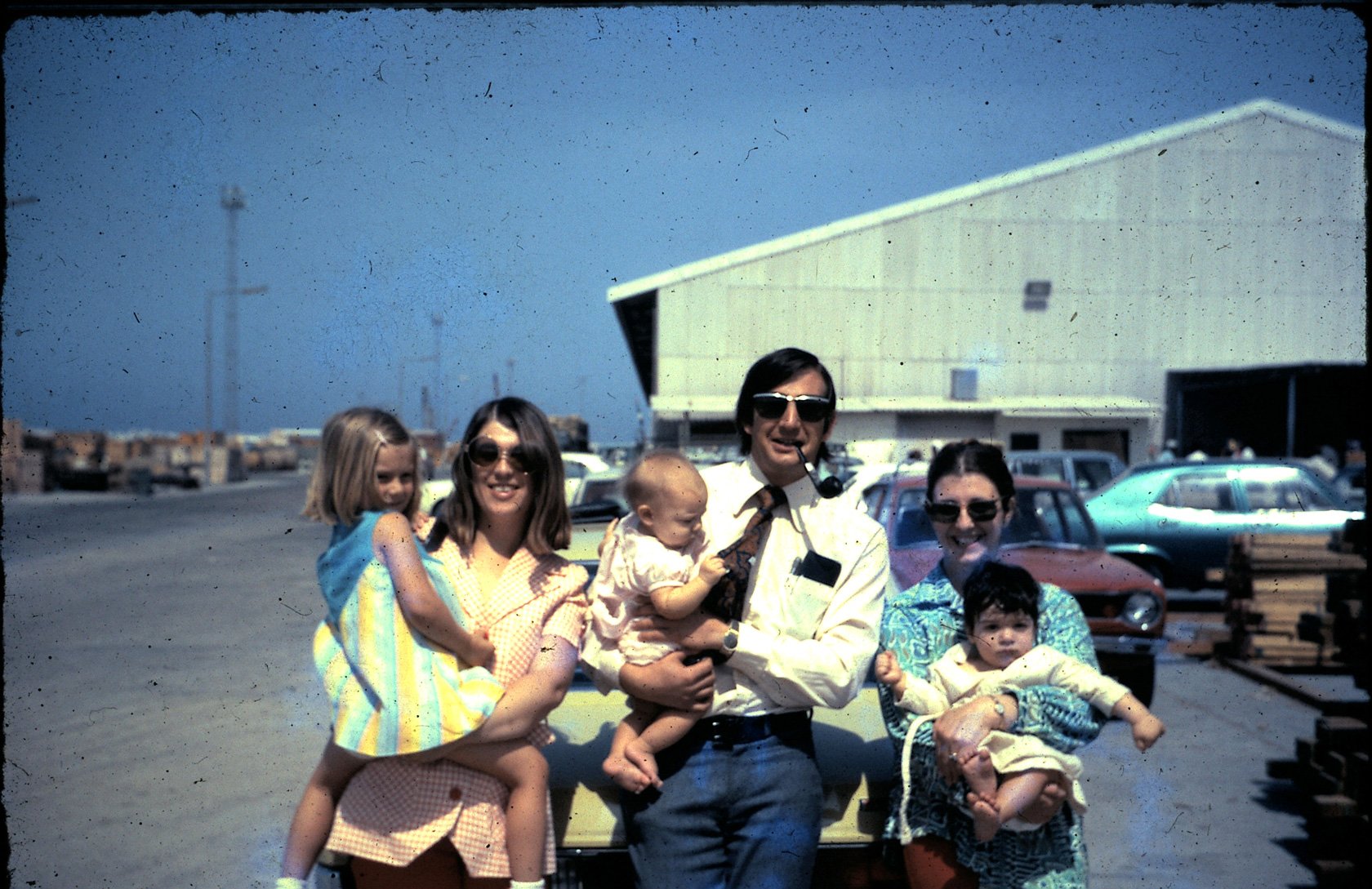
Tuesday, 13 March 1973
Baghdad (Iraq) to Basrah (Iraq)
Basrah, finally, and we locate two Manchester acquaintances, their address given by Kais. Salim Al-Hasso, also in the computing field, and working for the Port Authority – very fortunately for us – and Miga, his Chinese wife. She is the only Chinese person in Iraq and something of a bureaucratic problem, for she has a British passport to complicate matters further. Al-Hasso, as a student, preferred painting to his studies, but now, like Kais, has got involved in his work.
Wednesday, 14 March 1973
Basrah (Iraq)
We find that the boat 'Dwarka' is to sail tomorrow, not on the 16th, as we had been informed in London. We also find that, thanks to the US devaluation and the general apprehension over the dollar, we are down to our last 'pennies'. While V and Al-Hasso see to the details of getting us and our luggage ready for embarking, Miga and I spend a very pleasant day. She has a little girl of three who got on very well with Barge and kept him fairly well occupied.
Thursday, 15 March 1973
...off to Bombay (India)
An almighty scramble to get aboard and without Salim's help we should be in a desperate situation. The business of getting on board seemed almost as involved as our entry into Iraq, and it was wangled that we by-passed customs in order to sail with the Dwarka. Even then V only just managed to hop onto the gang-plank as we were leaving at 2pm. We thankfully sank exhausted in our cabin, and L set up the inevitable nappy line.
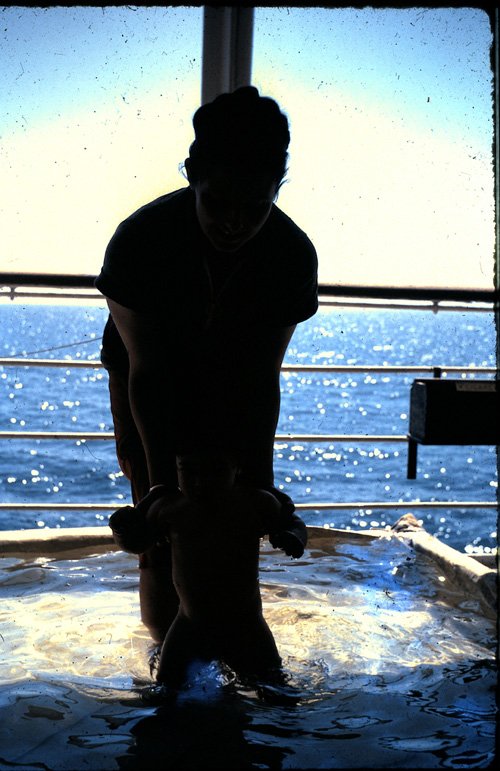
Epilogue:
